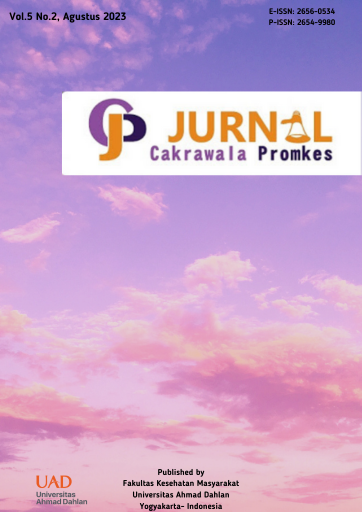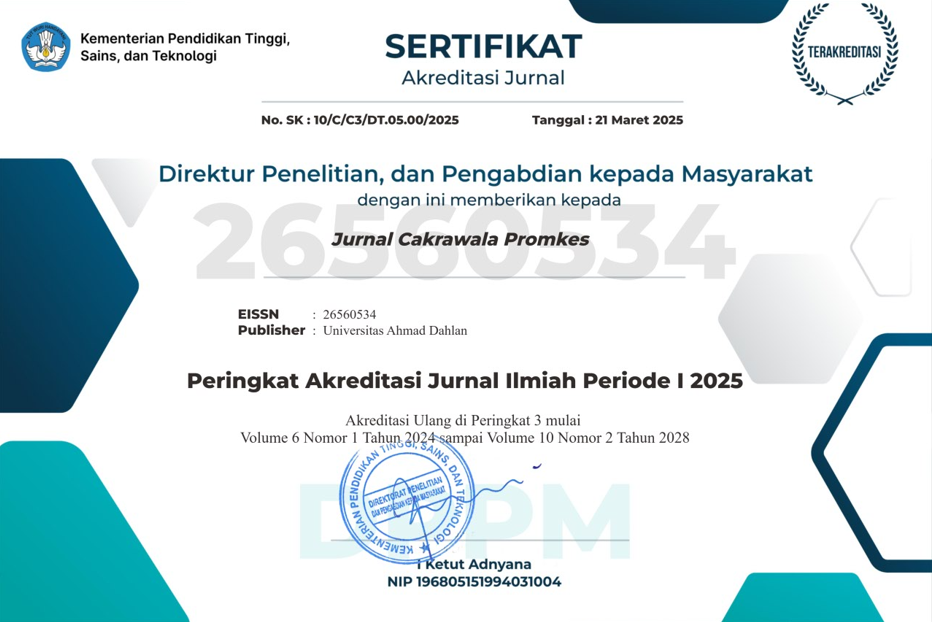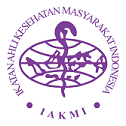Effects of domestic violence on antenatal depression: meta-analysis
DOI:
https://doi.org/10.12928/promkes.v5i2.7701Keywords:
Antenatal Depression, Domestic Violence, Meta-analysisAbstract
Antenatal depression or depression in pregnant women is influenced by various factors, one of which is the stressor of the social life of the household life, such as domestic violence. Domestic abuse during pregnancy has a negative impact on the mother's health as well as the newborn's and the child's development. The purpose of this study is to determine how much domestic violence affects antenatal depression. This study uses a meta-analytic study design from articles published from 2008 to 2022 using the Google Scholar, PubMed, Springer Link, and ScienceDirect databases. Articles are collected for 2 months by keywords (“Intimate Partner Violence” OR “IPV” OR “Domestic Violence”) AND “Antenatal Depression” OR “Antepartum Depression” AND (“adjusted odds ratio” OR “multivariable”). The articles used are articles that meet the inclusion and exclusion criteria. There were 14 articles from 3 continents namely Asia, Africa, and North America with cross sectional and cohort study designs. Cross-sectional meta-analysis shows that domestic violence can increase the incidence of antenatal depression by 3.97 times compared by not experiencing domestic violence (aOR= 3.97; 95% CI= 2.44 to 6.47; p<0.001). Meanwhile, the cohort study showed that domestic violence can increase the incidence of antenatal depression by 2.58 times compared to not experiencing domestic violence (aOR= 2.58; 95% CI= 2.06 to 3.23; p<0.001). Total heterogeneity shows I2 = 81%, such that it can be said that the data distribution is heterogeneous (random effect model). Domestic violence can increase the incidence of antenatal depression.
References
NIMH. Depression Basics. Maryland: National Institute of Mental Health; 2016.
WFMH. Depression: A Global Crisis. USA: World Federation for Mental Health; 2012.
Madlala SS, Kassier SM. Antenatal and postpartum depression: Effects on infant and young child health and feeding practices. South African J Clin Nutr [Internet]. 2018;31(1):1–7. Available from: http://doi.org/10.1080/16070658.2017.1333753
WHO. Mental Health. Geneva: World Health Organization; 2018.
Peltzer K, Pengpid S. High prevalence of depressive symptoms in a national sample of adults in Indonesia: Childhood adversity, sociodemographic factors and health risk behaviour. Asian J Psychiatr [Internet]. 2018;33(March):52–9. Available from: https://doi.org/10.1016/j.ajp.2018.03.017
Albert PR. Why is depression more prevalent in women? J Psychiatry Neurosci. 2015;40(4):219–21.
Mughal S, Azhar Y, Siddiqui W. Postpartum Depression [Internet]. StatPearls Publishing LLC; 2020. Available from: https://www.ncbi.nlm.nih.gov/books/NBK519070/
Zheng B, Zhu X, Hu Z, Zhou W, Yu Y, Yin S, et al. The prevalence of domestic violence and its association with family factors: A cross-sectional study among pregnant women in urban communities of Hengyang City, China. BMC Public Health. 2020;20(1):1–9.
Donovan BM, Spracklen CN, Schweizer ML, Ryckman KK, Saftlas AF. Intimate partner violence during pregnancy and the risk for adverse infant outcomes: a systematic review and meta-analysis. BJOG An Int J Obstet Gynaecol. 2016;123(8):1289–99.
Connelly CD, Hazen AL, Baker-Ericzén MJ, Landsverk J, Horwitz SMC. Is screening for depression in the perinatal period enough? The co-occurrence of depression, substance abuse, and intimate partner violence in culturally diverse pregnant women. J Women’s Heal. 2013;22(10):844–52.
Audi CAF, Segall-Corrêa AM, Santiago SM, Andrade M da GG, Pérez-Escamilla R. Violence against pregnant women: prevalence and associated factors. Rev Saúde Pública. 2008;42(5):1–9.
Beketie ED, Kahsay HMB, Nigussie FG, Tafese WT. Magnitude and associated factors of antenatal depression among mothers attending antenatal care in Arba Minch town, Ethiopia, 2018. PLoS One [Internet]. 2021;16(12 December):1–14. Available from: http://dx.doi.org/10.1371/journal.pone.0260691
Brittain K, Myer L, Koen N, Koopowitz S, Donald KA, Barnett W, et al. Risk factors for antenatal depression and associations with infant birth outcomes: Results from a south african birth cohort study. Paediatr Perinat Epidemiol. 2015;29(6):504–14.
Beyene GM, Azale T, Gelaye KA, Ayele TA. Depression remains a neglected public health problem among pregnant women in Northwest Ethiopia. Arch Public Heal. 2021;79(1):1–12.
Belay YA, Moges NA, Hiksa FF, Arado KK, Liben ML. Corrigendum to: Prevalence of antenatal depression and associated factors among pregnant women attending antenatal care at dubti hospital: A case of pastoralist region in Northeast Ethiopia (Depression Research and Treatment (2018) 2018 (1659089) DOI: 10. Depress Res Treat. 2019;2019.
Habtamu Belete A, Alemayehu Assega M, Alemu Abajobir A, Abebe Belay Y, Kassahun Tariku M. Prevalence of antenatal depression and associated factors among pregnant women in Aneded woreda, North West Ethiopia: A community based cross-sectional study. BMC Res Notes [Internet]. 2019;12(1):1–6. Available from: https://doi.org/10.1186/s13104-019-4717-y
Govender D, Naidoo S, Taylor M. Antenatal and Postpartum Depression: Prevalence and Associated Risk Factors among Adolescents’ in KwaZulu-Natal, South Africa. Depress Res Treat. 2020;2020.
Lodebo M, Birhanu D, Abdu S, Yohannes T. Magnitude of Antenatal Depression and Associated Factors among Pregnant Women in West Badewacho Woreda, Hadiyya Zone, South Ethiopia: Community Based Cross Sectional Study. Depress Res Treat. 2020;2020.
Tamiru D, Misgana T, Tariku M, Tesfaye D, Alemu D, Weldesenbet AB, et al. Prevalence and Associated Factors of Common Mental Disorders Among Pregnant Mothers in Rural Eastern Ethiopia. Front Psychiatry. 2022;13(March):1–10.
Yu H, Jiang X, Bao W, Xu G, Yang R, Shen M. Association of intimate partner violence during pregnancy, prenatal depression, and adverse birth outcomes in Wuhan, China. BMC Pregnancy Childbirth. 2018;18(1):1–7.
Manongi R, Rogathi J, Sigalla G, Mushi D, Rasch V, Gammeltoft T, et al. The Association Between Intimate Partner Violence and Signs of Depression During Pregnancy in Kilimanjaro Region, Northern Tanzania. J Interpers Violence. 2020;35(23–24):5797–811.
Kaiyo-Utete M, Dambi JM, Chingono A, Mazhandu FSM, Madziro-Ruwizhu TB, Henderson C, et al. Antenatal depression: An examination of prevalence and its associated factors among pregnant women attending Harare polyclinics. BMC Pregnancy Childbirth. 2020;20(1):1–8.
Woldetensay YK, Belachew T, Biesalski HK, Ghosh S, Lacruz ME, Scherbaum V, et al. The role of nutrition, intimate partner violence and social support in prenatal depressive symptoms in rural Ethiopia: Community based birth cohort study. BMC Pregnancy Childbirth. 2018;18(1):1–10.
Rodriguez MA, Valentine J, Ahmed SR, Eisenman DP, Sumner LA, Heilemann M V., et al. Intimate Partner Violence and Maternal Depression During the Perinatal Period: A Longitudinal Investigation of Latinas. Violence Against Women. 2010;16(5):543–559.
Nhi TT, Hanh NTT, Hinh ND, Toan N Van, Gammeltoft T, Rasch V, et al. Intimate Partner Violence among Pregnant Women and Postpartum Depression in Vietnam: A Longitudinal Study. Biomed Res Int. 2019;2019.
Sardinha L, Maheu-Giroux M, Stöckl H, Meyer SR, García-Moreno C. Global, regional, and national prevalence estimates of physical or sexual, or both, intimate partner violence against women in 2018. Lancet. 2022;399(10327):803–13.
Mahenge B, Likindikoki S, Stöckl H, Mbwambo J. Intimate partner violence during pregnancy and associated mental health symptoms among pregnant women in Tanzania: A cross-sectional study. BJOG An Int J Obstet Gynaecol. 2013;120(8):940–7.
Wu Z, Zhao P, Long Z, Li J, Yang G, Zhang Q, et al. Biomarker screening for antenatal depression in women who underwent caesarean section: A matched observational study with plasma Lipidomics. BMC Psychiatry. 2019;19(1):1–12.
Dadi AF, Miller ER, Mwanri L. Antenatal depression and its association with adverse birth outcomes in low and middleincome countries: A systematic review and meta-analysis. PLoS One [Internet]. 2020;15(1):1–23. Available from: http://dx.doi.org/10.1371/journal.pone.0227323
Downloads
Published
Issue
Section
License
Copyright (c) 2023 Dinda Anindita Salsabilla, Maya Ayu Riestiyowati, Tyas Aisyah Putri., S.Tr.Keb,. MKM., Norayuni Mohd Ismail

This work is licensed under a Creative Commons Attribution-ShareAlike 4.0 International License.
Authors who publish with JCP: Jurnal Cakrawala Promkes agree to the following terms:
- Authors retain copyright and grant the journal the right of first publication with the work simultaneously licensed under a Creative Commons Attribution License (CC BY-SA 4.0) that allows others to share the work with an acknowledgement of the work's authorship and initial publication in this journal.
- Authors are able to enter into separate, additional contractual arrangements for the non-exclusive distribution of the journal's published version of the work (e.g., post it to an institutional repository or publish it in a book), with an acknowledgement of its initial publication in this journal.
- Authors are permitted and encouraged to post their work online (e.g., in institutional repositories or on their website) prior to and during the submission process, as it can lead to productive exchanges, as well as earlier and greater citation of published work.

This work is licensed under a Creative Commons Attribution-ShareAlike 4.0 International License












